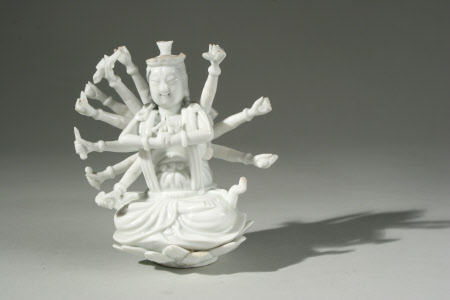Figure
Category
Ceramics
Date
c. 1650
Materials
Porcelain
Measurements
140 mm (Height)
Place of origin
Dehua
Order this imageCollection
Belton House, Lincolnshire
NT 433477
Summary
This item was stolen on 12/10/2025. If you have any information concerning this item, please contact the National Trust at Belton House on 01476 566 116. Or contact the Operational Risk Department of the National Trust by email at operationalrisk@nationaltrust.org.uk, or our Supporter Services Centre on 0344 800 1895 or by email enquiries@nationaltrust.org.uk. You can provide your information anonymously. Thank you for your help. Figure of the Daoist deity Doumu or of a bodhisattva, porcelain, the figure with sixteen arms (three missing and one broken), seated on an open lotus flower, Dehua, Fujian Province, China, c. 1650, covered with a white glaze.
Full description
Because of the syncretic nature of East-Asian religions (sharing characteristics and imagery), the Daoist deity Doumu (Mother of the Great Chariot) is often depicted in a way that is similar to various multi-armed bodhisattva (Buddhist figures who, though spiritually enlightened, remain on earth to help others). Dehua porcelain was popular in 17th-century Europe, where it became known as blanc de Chine (‘Chinese white’). Some Dehua objects were originally intended for religious devotion, but in Europe they were used decoratively and as evocations of ‘the East’.
Provenance
Purchased by the National Trust with support from the National Heritage Memorial Fund, 1984.
